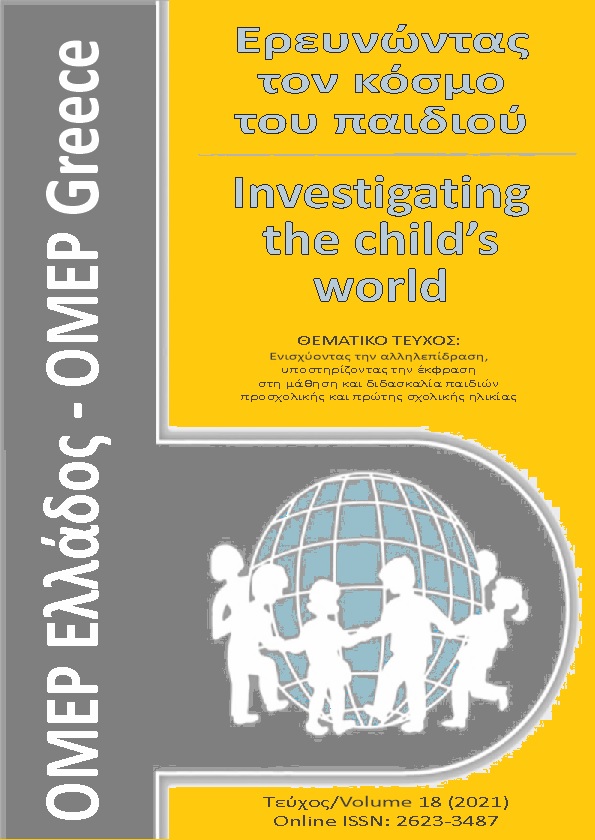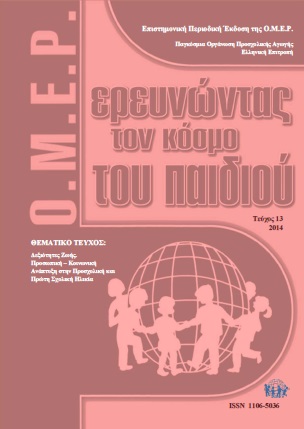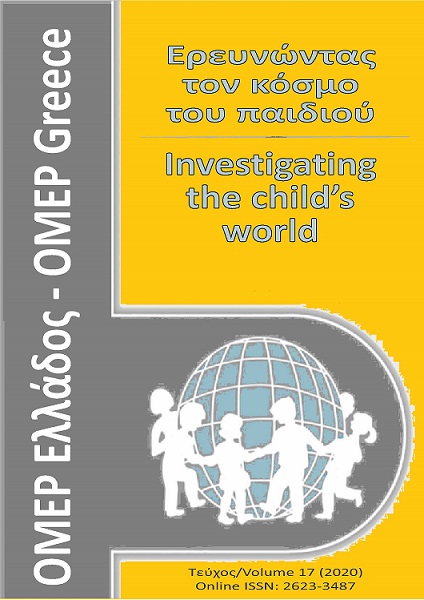Διερεύνηση των αντιλήψεων των νηπιαγωγών για τις προσδοκίες των γονέων από το νηπιαγωγείο σε σχέση με το γραμματισμό

Περίληψη
Η παρούσα μελέτη αποτελεί μέρος μιας ευρύτερης έρευνας που πραγματοποιήθηκε στα 13 δημόσια νηπιαγωγεία της πόλης του Πύργου, κατά το σχολικό έτος 2017-2018 και περιγράφει τις αντιλήψεις των νηπιαγωγών για τις προσδοκίες των γονέων από το νηπιαγωγείο, σχετικά με το γραμματισμό. Στην έρευνα συμμετείχαν οι 29 νηπιαγωγοί που εργάζονταν στα νηπιαγωγεία και τα δεδομένα συλλέχτηκαν μέσω ημιδομημένων συνεντεύξεων. Με βάση τα αποτελέσματα, η πλειονότητα των νηπιαγωγών πιστεύει ότι όλοι οι γονείς, αλλά σε διαφορετική ένταση, προσδοκούν να μάθουν τα νήπια να γράφουν και αν είναι δυνατόν να διαβάζουν, πριν το Δημοτικό Σχολείο (Δ.Σ). Οι διακυμάνσεις που παρατηρούνται μεταξύ των προσδοκιών των γονέων σχετίζονται, κατά κύριο λόγο με το μορφωτικό επίπεδο των γονέων. Γονείς με ανώτερο μορφωτικό επίπεδο θεωρούν ότι παίζουν σημαντικό ρόλο στη εκπαίδευση των παιδιών, ασχολούνται μαζί τους, κατανοούν το ρόλο του νηπιαγωγείου και είναι πιο συνεργάσιμοι με τις νηπιαγωγούς, ενώ γονείς με χαμηλό μορφωτικό επίπεδο θεωρούν υπεύθυνο το σχολείο να διδάξει τα παιδιά, δεν είναι ιδιαίτερα ενήμεροι για το ρόλο του νηπιαγωγείου και θα ήθελαν το παιδί να ξέρει να γράφει και να διαβάζει ώστε να είναι έτοιμο για το Δ.Σ. Από τα αποτελέσματα προκύπτει ότι είναι αναγκαία η ενημέρωση των γονέων για το ρόλο του νηπιαγωγείου και τον τρόπο που κάποιος γίνεται εγγράμματος, ώστε να γεφυρωθεί το χάσμα μεταξύ παιδιών που προέρχονται από διαφορετικά περιβάλλοντα και να οικοδομηθεί η καλύτερη δυνατή συνεργασία μεταξύ γονέων-εκπαιδευτικών προς όφελος των παιδιών.
Λεπτομέρειες άρθρου
- Πώς να δημιουργήσετε Αναφορές
-
Τσίρμπα Χ., & Στελλάκης Ν. (2021). Διερεύνηση των αντιλήψεων των νηπιαγωγών για τις προσδοκίες των γονέων από το νηπιαγωγείο σε σχέση με το γραμματισμό. Ερευνώντας τον κόσμο του παιδιού, 18, 102–110. https://doi.org/10.12681/icw.30025
- Τεύχος
- Τόμ. 18 (2021)
- Ενότητα
- Επιστημονική αρθρογραφία & εκπαιδευτικές δράσεις

Αυτή η εργασία είναι αδειοδοτημένη υπό το CC Αναφορά Δημιουργού – Μη Εμπορική Χρήση 4.0.
Οι Συγγραφείς που δημοσιεύουν εργασίες τους σε αυτό το περιοδικό συμφωνούν στους παρακάτω όρους:
Οι Συγγραφείς διατηρούν τα Πνευματικά Δικαιώματα και χορηγούν στο περιοδικό το δικαίωμα της πρώτης δημοσίευσης ενώ ταυτόχρονα τα πνευματικά δικαιώματα της εργασίας προστατεύονται σύμφωνα με την Creative Commons Attribution License που επιτρέπει σε τρίτους - αποδέκτες της άδειας να χρησιμοποιούν την εργασία όπως θέλουν με την προϋπόθεση της διατήρησης των διατυπώσεων που προβλέπονται στην άδεια σχετικά με την αναφορά στον αρχικό δημιουργό και την αρχική δημοσίευση σε αυτό το περιοδικό.
Οι Συγγραφείς μπορούν να συνάπτουν ξεχωριστές, και πρόσθετες συμβάσεις και συμφωνίες για την μη αποκλειστική διανομή της εργασίας όπως δημοσιεύτηκε στο περιοδικό αυτό (π.χ. κατάθεση σε ένα ακαδημαϊκό καταθετήριο ή δημοσίευση σε ένα βιβλίο), με την προϋπόθεση της αναγνώρισης και την αναφοράς της πρώτης δημοσίευσης σε αυτό το περιοδικό.
Το περιοδικό επιτρέπει και ενθαρρύνει τους Συγγραφείς να καταθέτουν τις εργασίες τους μέσω διαδικτύου (π.χ. σε ένα ακαδημαϊκό καταθετήριο ή στους προσωπικές τους ιστοσελίδες) πριν και μετά από τις διαδικασίες της δημοσίευσης, καθώς αυτό μπορεί να οδηγήσει σε παραγωγική ανταλλαγή ιδεών και σκέψεων καθώς επίσης και σε γρηγορότερη και μεγαλύτερη χρήση και ευρετηρίαση της δημοσιευμένης εργασίας (See The Effect of Open Access).




